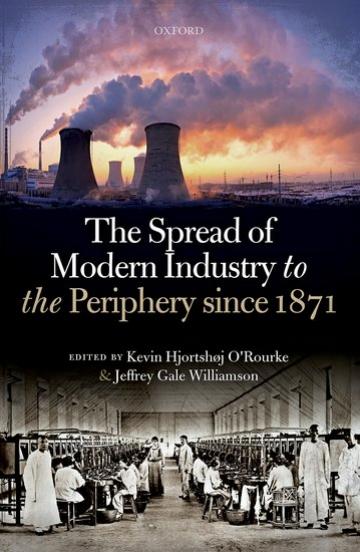Kevin H. O’Rourke and Jeffrey. G. Williamson (eds.), The Spread of Modern Industry to the Periphery since 1871 (OUP, 2017)

- Explores the nineteenth- and twentieth-century spread of modern industry to the global periphery
- Demonstrates how, in the twenty-first century, economies in Asia, Latin America and even sub-Saharan Africa are converging on the historically-wealthy economies of Europe and North America
- Seeks to understand the economic, historical, and political implications of this shift in industry
- Offers a comparative assessment of twelve regions: Russia, East-Central Europe, Southeast Europe, Italy, the Middle East, sub-Saharan Africa, South Asia, Southeast Asia, Northeast Asia, China, Northern Latin America, and Southern Latin America
Ever since the Industrial Revolution of the late-eighteenth and early-nineteenth centuries, industrialization has been the key to modern economic growth. The fact that modern industry originated in Britain, and spread initially to north-western Europe and North America, implied a dramatic divergence in living standards between the industrial North (or ‘West’) and a non-industrial, or even de-industrializing, South (or ‘Rest’). This nineteenth-century divergence, which had profound economic, military, and geopolitical implications, has been studied in great detail by many economists and historians.
Today, this divergence between the ‘West’ and the ‘Rest’ is visibly unravelling, as economies in Asia, Latin America and even sub-Saharan Africa converge on the rich economies of Europe and North America. This phenomenon, which is set to define the twenty-first century, both economically and politically, has also been the subject of a considerable amount of research. Less appreciated, however, are the deep historical roots of this convergence process, and in particular of the spread of modern industry to the global periphery. This volume fills this gap by providing a systematic, comparative, historical account of the spread of modern manufacturing beyond its traditional heartland, to Southern and Eastern Europe, the Middle East, Asia, Africa, and Latin America, or what we call the poor periphery. It identifies the timing of this convergence, finding that this was fastest in the interwar and post-World War II years, not the more recent ‘miracle growth’ years. It also identifies which driving forces were common to all periphery countries, and which were not.
1: Introduction, Kevin O’Rourke and Jeffrey Williamson
2: Measuring the Spread of Modern Manufacturing to the Poor Periphery, Agustín Bénétrix, Kevin O’Rourke, and Jeffrey Williamson
Europe and the Middle East
3: State and Market in Russian Industrialization, Steven Nafziger and Andrei Markevich
4: East and Central Europe, Alex Klein, Max Schulze, and Tamás Vonyó
5: Industrialization and De-Industrialization in Southeast Europe, Michael Kopsidis and Martin Ivanov
6: The Industrialization of Italy 1861-1971, Matteo Gomellini and Gianni Toniolo
7: Industrialization in Egypt and Turkey, 1870-2010, Ulas Karakoç, Laura Panza, and Sevket Pamuk
Asia
8: East Asian Industrial Pioneers: Japan, Korea and Taiwan, Dwight Perkins and John Tang
9: Industrialization in China, Loren Brandt, Debin Ma, and Thomas Rawski
10: From Artisanal Production to Machine Tools: Industrialization in India over the Long Run, Bishnupriya Gupta and Tirthankar Roy
11: From Commodity Booms to Economic Miracles: Why Southeast Asian Industry Lagged Behind, Jean-Pascal Bassino and Jeffrey Williamson
Latin America
12: Industrial Growth in Mexico and Peru over the Long Run, Aurora Gómez Galvarriato and Graciela Márquez Colín
13: The Industrialization of South America: Argentina, Brazil, Chile, and Colombia, 1890-2010, Gerardo della Paolera, Xavier Duran, and Aldo Musacchio
Sub-Saharan Africa
14: Patterns of Manufacturing Growth in Sub-Saharan Africa: From Colonization to the Present:, Gareth Austin, Ewout Frankema, and Morten Jerven
Kevin Hjortshøj O’Rourke is the Chichele Professor of Economic History at the University of Oxford, a Fellow of All Souls College, and the Research Director of the Centre for Economic Policy Research. He received his PhD from Harvard in 1989. He has previously taught at Trinity College Dublin, University College Dublin, Columbia University, and Sciences Po, Paris. He is a Member of the Royal Irish Academy and a Fellow of the British Academy, and has served as President of the European Historical Economics Society, and Vice-President of the Economic History Association. He has worked extensively on the history of the international economy.
Jeffrey Gale Williamson is Laird Bell Professor of Economics, emeritus, Harvard University, Honorary Fellow, Department of Economics, University of Wisconsin-Madison, Research Associate NBER and Research Fellow CEPR. President of the Economic History Association (1994-1995), Chairman of the Harvard Economics Department (1997-2000), and Master of Harvard’s Mather House (1986-1993), his most recent books are: Unequal Gains: American Growth and Inequality since 1700 (2016, with Peter Lindert) The Cambridge History of Capitalism (2 vols. 2014, edited with Larry Neal) Trade and Poverty: When the Third World Fell Behind (2011) Globalization and the Poor Periphery before 1950 (2006) and Global Migration and the World Economy (2005, with Timothy Hatton)
Gareth Austin, University of Cambridge
Jean-Pascal Bassino, Ecole normale supérieure de Lyon
Agustín Bénétrix, Trinity College Dublin
Loren Brandt, University of Toronto
Gerardo della Paolera, Universidad de San Andres
Xavier Duran, Manchester Business School
Ewout Frankema, Wageningen University
Matteo Gomellini , Banca d’Italia
Aurora Gómez Galvarriato, Harvard University
Bishnupriya Gupta, University of Warwick
Martin Ivanov, Bulgarian Academy of Sciences
Morten Jerven, Simon Fraser University
Ula Karakoç, London School of Economics
Alexander Klein, University of Kent
Michael Kopsidis, Institute of Agricultural Development in Transition Economies
Debin Ma, London School of Economics
Andrei Markevich, The New Economic School
Graciela Márquez Colín, Universidad Nacional Autónoma de México
Aldo Musacchio, Brandeis University
Steven Nafziger, Williams College
Kevin O’Rourke, All Souls College, Oxford
Sevket Pamuk, The Ataturk Institute for Modern Turkish History
Laura Panza, University of Melbourne
Dwight Perkins, Harvard University
Thomas Rawski, University of Pittsburgh
Tirthankar Roy, London School of Economics
Max-Stephan Schulze, London School of Economics
John Tang, Australian National University
Gianni Toniolo, Duke University
Tamás Vonyó, Bocconi University
Jeffrey Williamson, emeritus, Harvard University
30 MARCH 2017 | 416 PAGES | HARDBACK | OXFORD UNIVERSITY PRESS
ISBN: 9780198753643



